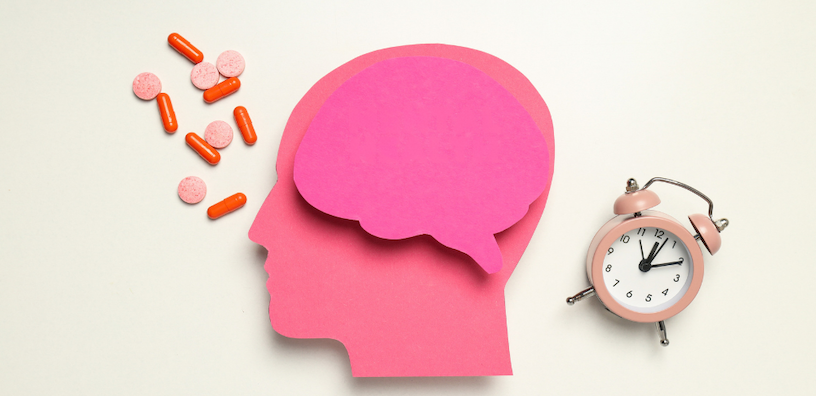You wouldn’t skip leg day—so why skip training your brain? Just like your body, your brain needs exercise to stay sharp and resilient.
With more people looking to boost memory, concentration, and mental clarity, brain health is taking center stage. In 2022, over half of U.S. adults facing mental health challenges sought treatment, and the brain supplement market has continued to boom.
Mental workouts, mindfulness, and brain-boosting supplements aren’t just nice-to-haves—they’re essential for staying focused and performing at your best.
Want to stay sharp, think faster, and handle stress like a pro? Let’s dive in.
The Power of Boredom: Letting Your Mind Breathe
In a world of constant stimulation, we rarely let ourselves just be. Constant distractions (hello, endless scrolling) weaken our ability to stay focused, and just as your body needs time to recover after a taxing workout, your mind also benefits from moments of stillness.
Embracing boredom is a superpower you’ve been ignoring. In those quiet moments, you unlock creativity, sharpen problem-solving, and allow your brain to reset, reducing stress and boosting cognitive function—it’s the ultimate mental workout[1].

If you’re struggling with this, here are some mental exercises that can help you thrive in the mundane:
-
Incorporate mindful observation techniques:
- People-watching.
- Engage all senses, including what you see, hear, smell, taste, and feel.
- Accept current reality; simply observe it with openness and curiosity.
-
Take a walk or drive without music: Take a different route to work or go for a drive/walk without a particular destination.
-
Sit in silence for a few minutes daily: Opportune times to practice include first thing in the morning, as a break during the day, or right before bed.
-
Try a “dopamine detox” by unplugging from screens:
- Set a goal or intention (i.e. no screen time after work hours, one day without screens, lessening time on social media.)
- Create tech-free rooms in your home.
- Set time limits on apps you spend a lot of time on.
- Try meal times without your phone or watching TV.
- Avoid blue light before bed to improve sleep hygiene[2].

Managing Stress: Your Brain’s Cooldown Routine
Stress is like an invisible weight on your brain, dragging down focus, crippling performance, and sabotaging your ability to think clearly.
When stress is abundant, cognitive function is impaired, and as a result, it causes poor attention span and an overall lack of performance.
Just as you would turn to stretching and hydration to improve muscle fatigue, you also need a toolbox of recovery strategies to de-stress the mind[3].
Rest With Structured Breaks
-
Decide on break length
- Long breaks (20-30 minutes) when you need to disengage, tackle a complex problem, or feel significantly tired.
- Short breaks (5-10 minutes) when performing repetitive tasks, need to re-focus, or are mildly fatigued.
-
Time your breaks: Keep breaks intentional and punctual.
-
Create a pattern: Breaking at the same time daily can help the body anticipate a brain pause.
-
Add in an activity: Walking, meditation, reading, stretching, journaling, or calming music may help reset your brain.

Integrate Brain-Focused Supplements
-
Omega-3: Omega-3 is your brain’s best friend—think of it as mental fuel! It sharpens focus, improves memory, and supports overall cognitive health, all while keeping your heart in check. A win-win for your brain and body![4,5]
-
Ashwagandha: Stressed? Ashwagandha has got your back! This ancient herb works like a natural chill pill, easing stress, calming anxiety, and boosting your mood. Stay zen and stay sharp—mentally and emotionally.[6]
-
Lion's Mane: Feeling frazzled? Lion's Mane is your secret weapon for stress-free and laser! Found in mushrooms, this powerful bioactive compound helps clear brain fog, improves memory, and heightens concentration and focus. It’s your brain’s personal assistant[7]!
Problem-Solving: The Mental Gymnastics We All Need
Ever wish you felt more confident in decision-making or solving tough problems? Your brain might just need some training!
The ability to think clearly and make quick decisions can improve with practice. Mental fitness helps you stay sharp, make better choices, and come up with creative solutions on the fly. The best part? You can use these techniques below in your daily routine and turn them into lasting habits.
Reframe Problems:
Thomas Wedell-Wedellsborg, an expert on problem-solving and innovation, said it best: “The point of reframing is not to find the 'real' problem but to see if there's a better one to solve.”
So, try shifting your perspective to see challenges in a new light. This opens the door to creative solutions and better problem-solving.
Engage with Cognitive-Enhancing Tools:
Jigsaw Puzzles, Chess, Crossword Puzzles, Sudoku: Simple yet powerful exercises to stimulate your brain and improve cognitive abilities.
Brain Training Apps:
-
Lumosity: Fun games that boost memory, focus, and problem-solving.
-
Elevate: Focused on practical skills, like math, writing, and speaking.
Learn Something New:
-
Languages: Challenge your mind with a new language.
-
Creative Skills: Take up painting, try a new form of exercise, or even sign up for a cooking class!
Over time, adding these activities into your routine will help problem-solving and decision-making become easier and more intuitive.

Mental Toughness: The Key to Adaptability
What would a journey be without setbacks? It’s the tough and unpredictable moments in life that shape us the most—for better or worse.
Just like endurance training sessions help athletes reach their full potential, we, too, can develop mental fitness that is resilient in the face of change.
Learn from Failures
Life’s failures are a great place to learn. Look back on setbacks and ask yourself: What did I learn? How did I react? What would I do differently next time?
Connect these tough moments to where you are today and note if they led to growth or new opportunities.
Reshape Your Inner Dialogue
How you speak to yourself is crucial. Do you use a lot of negative self-talk, or is it uplifting and optimistic?
In the toughest moments, your inner dialogue is a secret weapon. When you think like a winner, your brain becomes more confident and reinforces success with every thought. In many cases, a higher level of self-worth positively impacts education, health, and relationships[8].
It might sound silly, but talking to yourself like you would a friend or family member can help with this practice. You could also write positive messages on sticky notes and place them somewhere you’ll see frequently—maybe around your mirror or at your desk.
Develop a Flexible Mindset
Developing a mind that can adapt and overcome will enable inner confidence and help you to stay calm during stressful situations.
Here are some ideas to diversify rigid routines:
-
Practice “What if?” scenarios: Prepare your mind for change by brainstorming different ways to handle unexpected challenges.
-
Embrace small changes daily: Go to the gym at a different time, allow for spontaneity on the weekends, or try new meals throughout the week.
-
Challenge routine thinking: When faced with resistance, ask yourself, Is there another way to see this?
-
Meditate or practice mindfulness: To improve emotional regulation and stay calm during change.
Ultimately, the brain’s ability to adapt and rewire plays the biggest role in mental toughness, but consistent training can build up this resilience over time.
A Strong Mind for a Strong Life
Your brain is your most powerful asset, and just like your body, it thrives with the right training and care. Strengthening your mental fitness doesn’t just help you stay sharp—it makes life easier. Whether you're tackling a big project at work, staying patient with loved ones, or pushing through a tough study session, a resilient mind gives you the edge.
By consistently practicing mindfulness, managing stress, and challenging your thinking, you’ll sharpen your focus and build the resilience needed to tackle anything life throws your way.
We've gone ahead and enclosed a 10% OFF coupon below to help you with your pattern of wellness - because feeling your best starts with the right support. Click here to start shopping!
----
Resources:
-
Donelli, D., Lazzeroni, D., Rizzato, M., & Antonelli, M. (2023). Silence and its effects on the autonomic nervous system: A systematic review. Progress in brain research, 280, 103–144. https://doi.org/10.1016/bs.pbr.2023.08.001
-
Silvani, M. I., Werder, R., & Perret, C. (2022). The influence of blue light on sleep, performance and wellbeing in young adults: A systematic review. Frontiers in physiology, 13, 943108. https://doi.org/10.3389/fphys.2022.943108
-
Liu, Q., Liu, Y., Leng, X., Han, J., Xia, F., & Chen, H. (2020). Impact of Chronic Stress on Attention Control: Evidence from Behavioral and Event-Related Potential Analyses. Neuroscience bulletin, 36(11), 1395–1410. https://doi.org/10.1007/s12264-020-00549-9
-
Derbyshire E. Brain Health across the Lifespan: A Systematic Review on the Role of Omega-3 Fatty Acid Supplements. Nutrients. 2018 Aug 15;10(8):1094. doi: 10.3390/nu10081094. PMID: 30111738; PMCID: PMC6116096. https://www.ncbi.nlm.nih.gov/pmc/articles/PMC6116096/
-
Stachowicz K. The role of polyunsaturated fatty acids in neuronal signaling in depression and cognitive processes. Arch Biochem Biophys. 2023 Mar 15;737:109555. doi: 10.1016/j.abb.2023.109555. Epub 2023 Feb 25. PMID: 36842491. https://pubmed.ncbi.nlm.nih.gov/36842491/
-
Chandrasekhar, K., Kapoor, J., & Anishetty, S. (2012). A prospective, randomized double-blind, placebo-controlled study of safety and efficacy of a high-concentration full-spectrum extract of ashwagandha root in reducing stress and anxiety in adults. Indian journal of psychological medicine, 34(3), 255–262. https://doi.org/10.4103/0253-7176.106022
- Martínez-Mármol, R., Chai, Y., Conroy, J. N., Khan, Z., Hong, S.-M., Kim, S. B., Gormal, R. S., Lee, D. H., Lee, J. K., Coulson, E. J., Lee, M. K., Kim, S. Y., & Meunier, F. A. (2023). Hericerin derivatives activates a pan-neurotrophic pathway in central hippocampal neurons converging to ERK1/2 signaling enhancing spatial memory. Journal of Neurochemistry, 00, 1– 18. https://doi.org/10.1111/jnc.15767
-
Cascio, C. N., O'Donnell, M. B., Tinney, F. J., Lieberman, M. D., Taylor, S. E., Strecher, V. J., & Falk, E. B. (2016). Self-affirmation activates brain systems associated with self-related processing and reward and is reinforced by future orientation. Social cognitive and affective neuroscience, 11(4), 621–629. https://doi.org/10.1093/scan/nsv136







Comments (0)